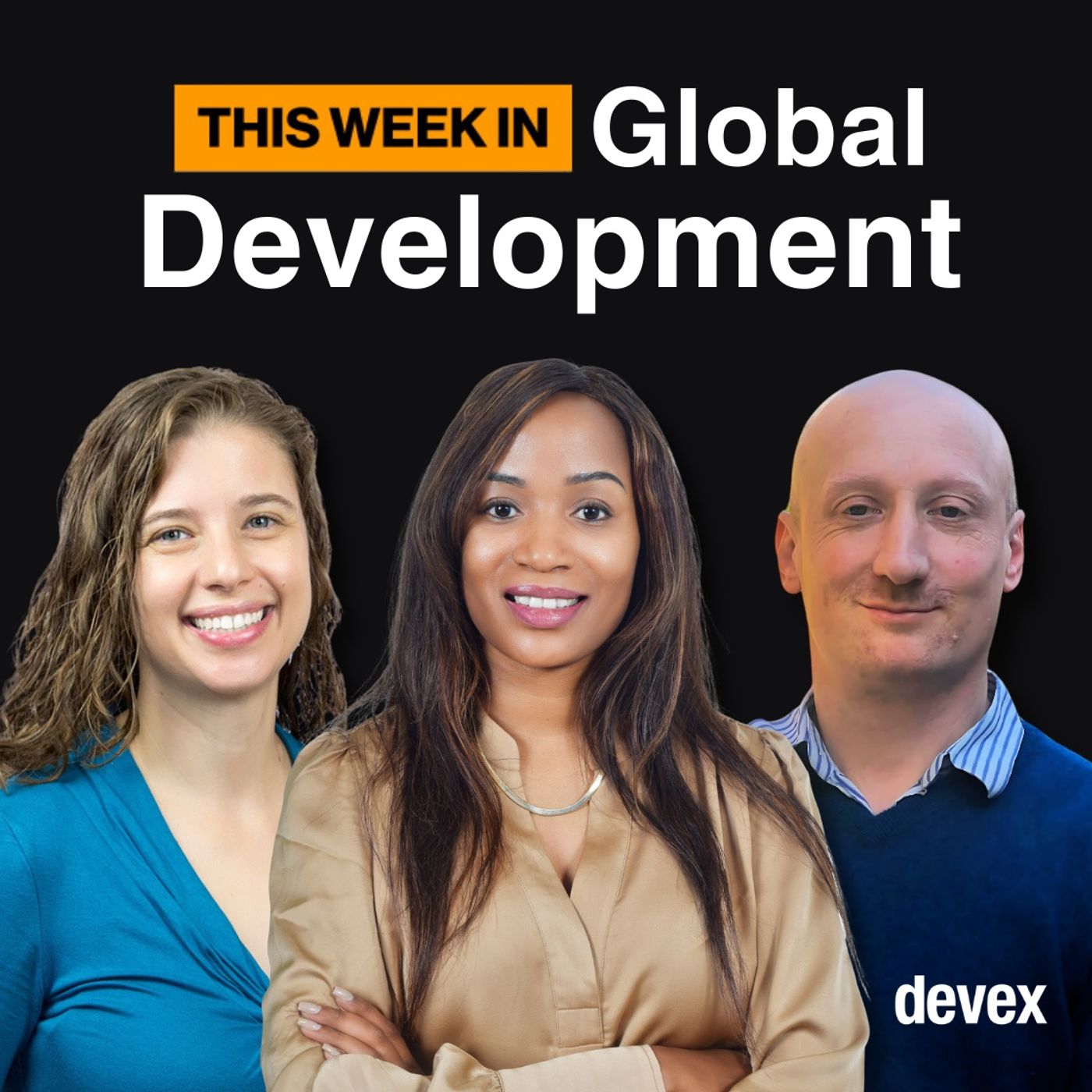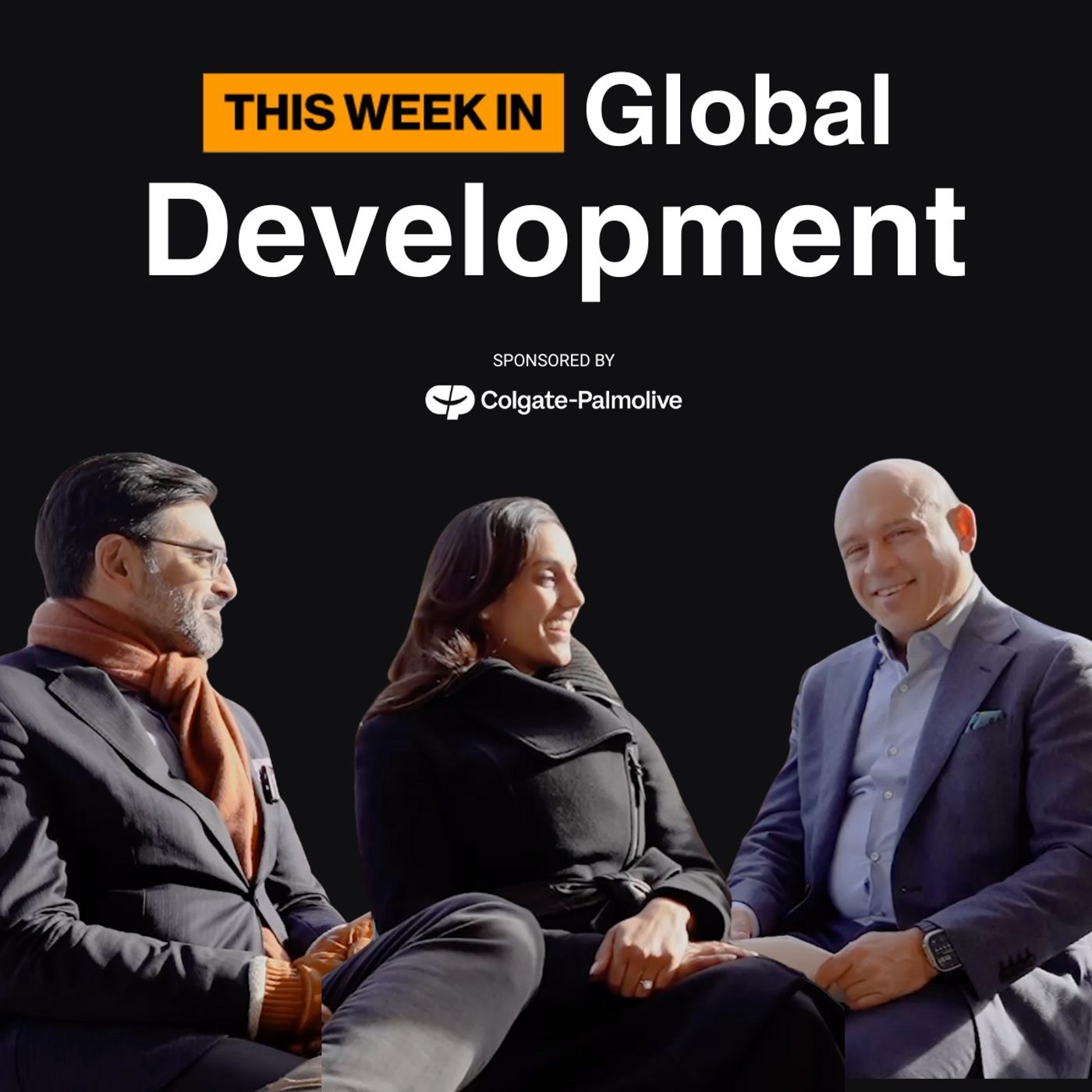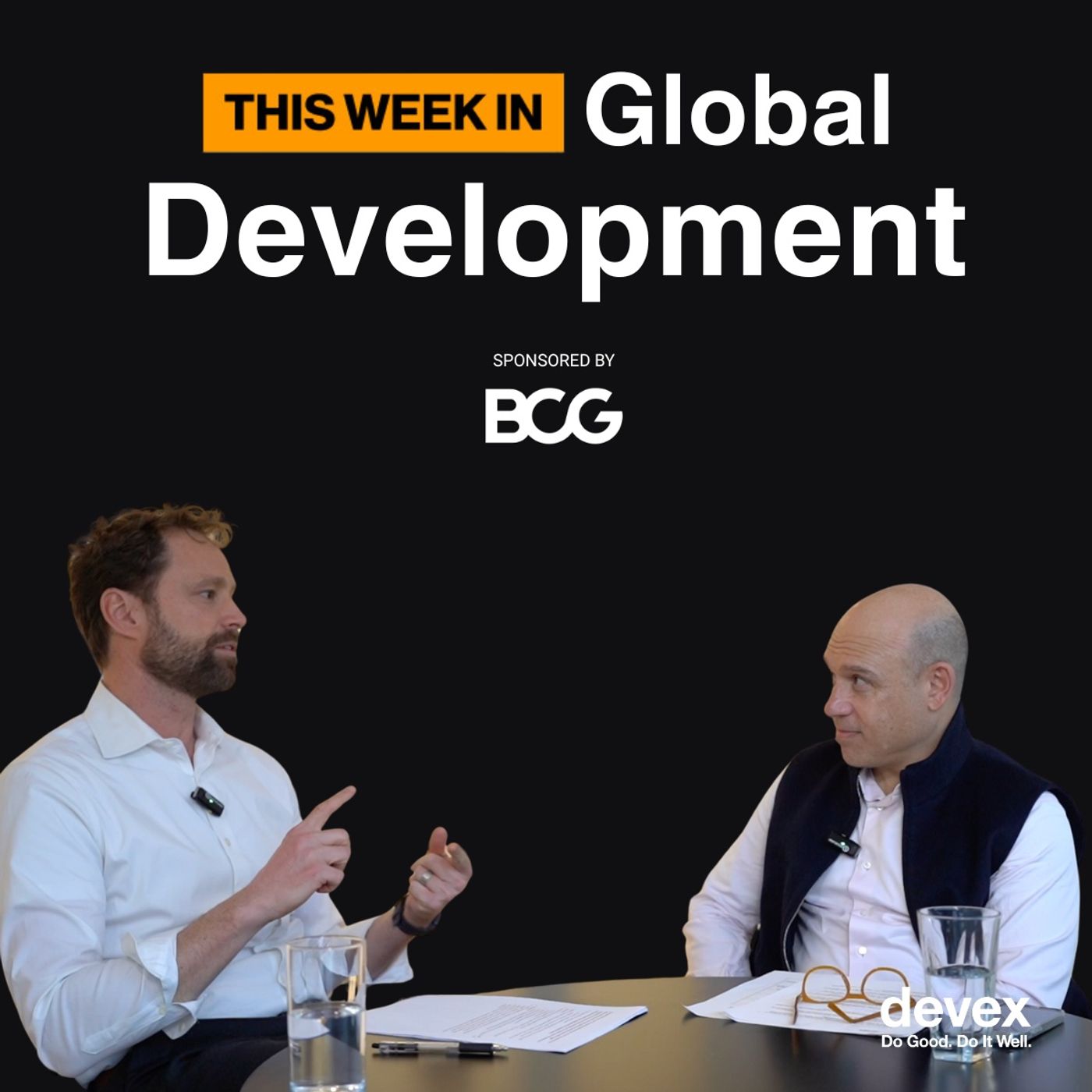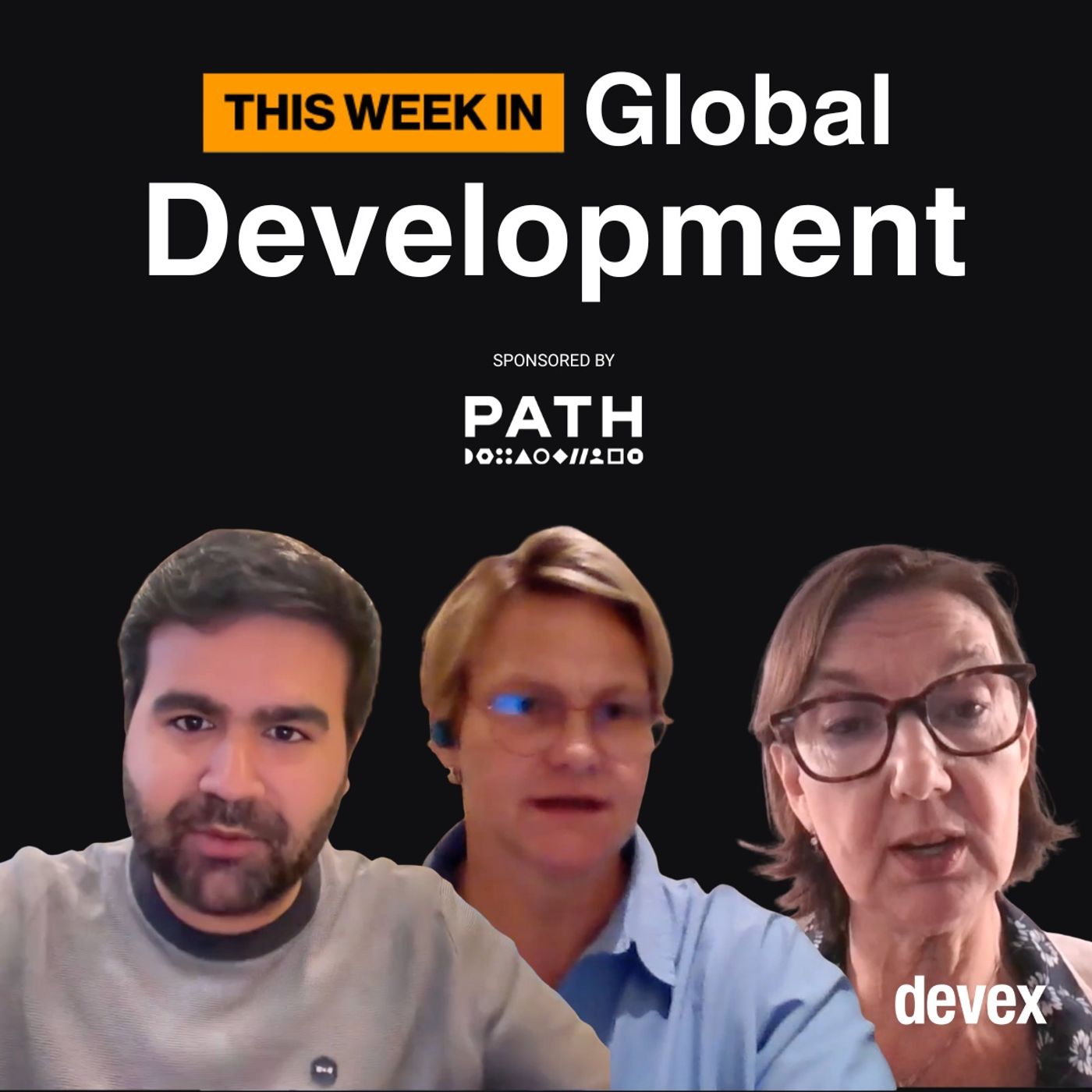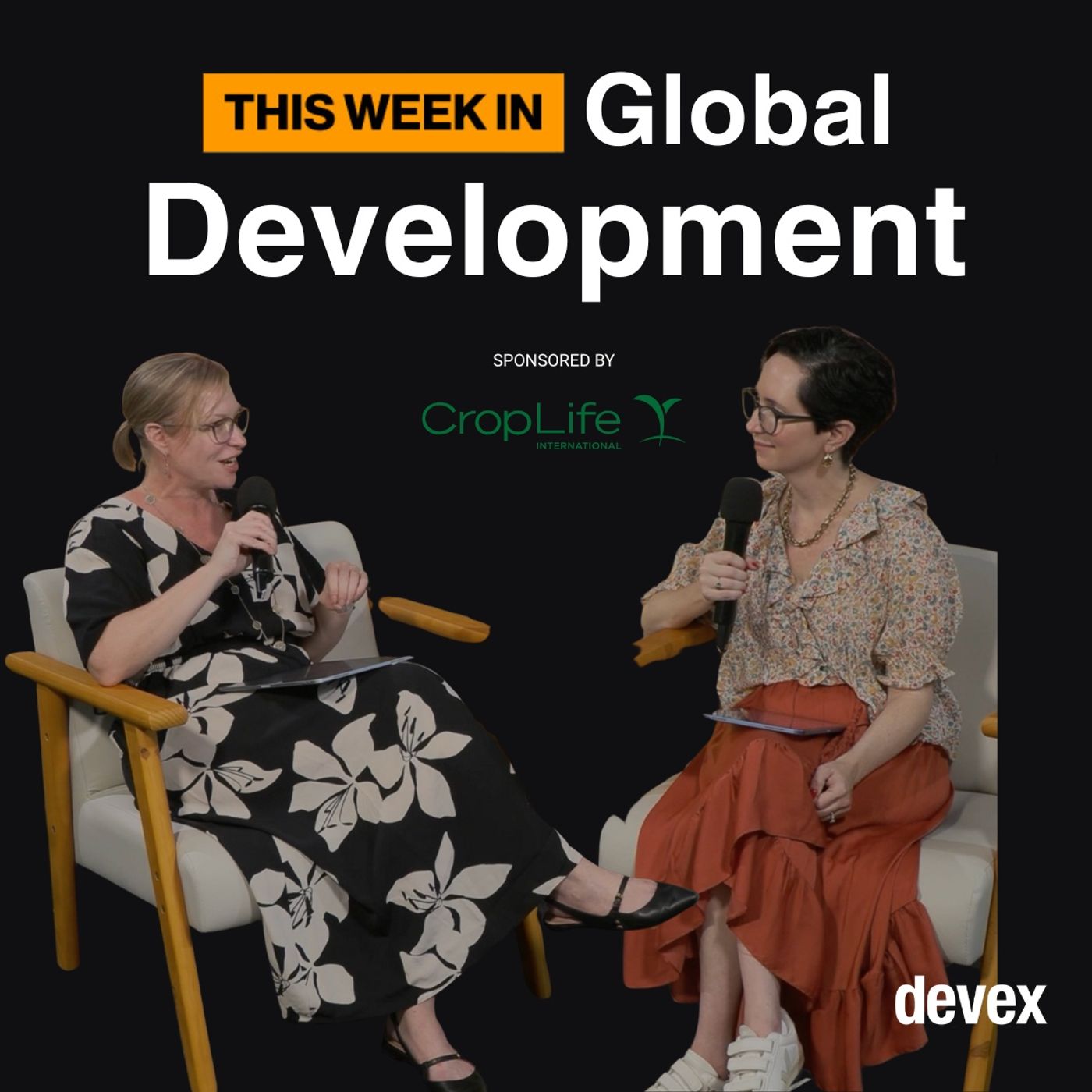Discover This Week in Global Development
This Week in Global Development

This Week in Global Development
Author: Devex | Global Development
Subscribed: 53Played: 1,217Subscribe
Share
© Copyright Devex
Description
Dive into the week's most critical global development news with the This Week in Global Development podcast.
In each episode, hosts Adva Saldinger, David Ainsworth, and Rumbi Chakamba break down major headlines and invite leading experts for insightful analysis.
Get up-to-date on news regarding foreign aid, humanitarian crises, the U.N.’s Sustainable Development Goals, finance, philanthropy, climate, food systems, global health, and stay informed on the latest trends and policy changes shaping global development.
Episodes are published every Friday and can also be watched on YouTube.
Subscribe to our YouTube channel:
https://www.youtube.com/@devex
Sign up to the Devex Newswire and our other newsletters: https://www.devex.com/account/newsletters
In each episode, hosts Adva Saldinger, David Ainsworth, and Rumbi Chakamba break down major headlines and invite leading experts for insightful analysis.
Get up-to-date on news regarding foreign aid, humanitarian crises, the U.N.’s Sustainable Development Goals, finance, philanthropy, climate, food systems, global health, and stay informed on the latest trends and policy changes shaping global development.
Episodes are published every Friday and can also be watched on YouTube.
Subscribe to our YouTube channel:
https://www.youtube.com/@devex
Sign up to the Devex Newswire and our other newsletters: https://www.devex.com/account/newsletters
189 Episodes
Reverse
In this episode of the This Week in Global Development podcast, Business Editor David Ainsworth is joined by Managing Editor Anna Gowel and Deputy Managing Editor Fiona Zublin to discuss the launch of Devex’s Power 50 list. The conversation highlights how the development landscape is shifting away from traditional power structures toward influential "movers and shakers" behind the scenes, including tech entrepreneurs, philanthropists, and leaders from the global south. Key figures mentioned include Anna Makanju of OpenAI, representing the impact of artificial intelligence on development, and Benjamin Black of the U.S. International Development Finance Corporation, illustrating the growing importance of private sector investment in global aid. Our discussion then moves to resource sovereignty, particularly concerning critical minerals on the African continent. The editors explore how countries such as Botswana, Ghana, and the Democratic Republic of Congo are implementing export bans and seeking more control over their natural resources to ensure local processing and economic benefits. To hear more, listen to this conversation on This Week in Global Development.
In this special edition of our podcast, This week in global development, we explore the critical yet often overlooked issue of oral health with guests Anil Soni, CEO of the WHO Foundation, and Esha Gupta, Head of Public Health and Social Impact at Colgate-Palmolive.Despite oral diseases affecting 3.7 billion people and being among the most common noncommunicable diseases, oral health has historically been siloed from systemic health discussions. This conversation highlights how oral health serves as a vital gateway to overall wellness — and makes the case for oral health as a key starting point for early health interventions.Recorded during the World Economic Forum in Davos, the episode focuses on a landmark multiyear partnership between the WHO Foundation and Colgate-Palmolive to scale oral health education and policy globally. This collaboration aims to integrate oral care into primary health systems, particularly in countries with high disease burdens, by building on the legacy of the Colgate Bright Smiles, Bright Futures children’s oral health education program alongside the WHO’s normative guidance. By moving from a traditional aid model to a strategic investment approach, the partnership seeks to elevate oral health on the global public health agenda and advance healthier futures for all.To hear more about this initiative and the case for investing in oral health, listen to this conversation with Anil Soni and Esha Gupta on the Devex podcast.
This week we report on the U.S. State Department’s radical expansion of the Mexico City Policy, also known as the global gag rule, which blocks U.S. federal funding to international nongovernmental organizations that provide or inform about abortion. Beyond the traditional reproductive health restrictions, three sweeping new rules now tether all U.S. foreign assistance to strict prohibitions on “gender ideology” as well as diversity, equity, and inclusion, or DEI, initiatives.During the conversation we also dig into the key findings of a report published by the European Network on Debt and Development, or Eurodad, which warns that modernized aid rules are focusing on the political and commercial priorities of wealthy donors while leaving the world's poorest countries buried in debt.We also touch on the Asian Infrastructure Investment Bank’s updated accountability and grievance mechanism, and our exclusive story which reveals through a set of leaked emails that the Beijing-based lender is sidestepping on-the-ground meetings with Indigenous communities over alleged human rights abuses at a tourism development project in Indonesia.To explore these stories, Senior Reporter Adva Saldinger sits down with Managing Editor Anna Gawel and Global Development Reporter Jesse Chase-Lubitz for the latest episode of our weekly podcast series.Sign up to the Devex Newswire and our other newsletters.
In this special edition of This Week in Global Development, recorded at Davos, we explore a fundamental shift in the development landscape: the move from funding gaps to impact-driven results. As global economic constraints and fragmented cooperation redefine the sector, the conversation is no longer just about how much money can be mobilized, but how leadership and innovation can scale impact in a complex world.Devex President and Editor-in-Chief Raj Kumar sits down with Jim Larson, managing director and senior partner at BCG, to discuss the “impact pivot” of 2026. Larson outlines how successful players are moving beyond traditional aid by integrating generative artificial intelligence as core infrastructure and restructuring their "capital stacks" through blended finance and private sector partnerships.From the necessity of market-driven efficiency to the rise of inclusive, localized coalitions, Larson shares case studies on how technology and innovative finance are moving the needle on global health. They also examine the specific characteristics defining successful development leaders in this new era of market imperatives.To hear more about the evolution of the development toolkit, listen to this conversation with Jim Larson on This Week in Global Development.Sign up to the Devex Newswire and our other newsletters.
This week, we are tuning in from Davos as we report from the annual meeting of the World Economic Forum. With Trump’s attendance and foreign policy dominating the summit, we discuss the most important updates for the global development community, including the Gates Foundation and OpenAI’s $50 million commitment to support AI-infused health programs across Africa.We examine the year’s defining narratives — specifically the shift toward sovereign, country-led initiatives — and explain why the global development community’s presence at Davos is vital to ensuring these voices shape the new international order.To bring you the latest from Davos, Senior Editor Rumbi Chakamba sits down with President and Editor-in-Chief Raj Kumar and Global Development Reporter Elissa Miolene for the latest episode of our weekly podcast series. During the sponsored segment of This Week in Global Development, brought to you by Pivotal, Catherine Cheney sits down with Action for Women’s Health grantee Naana Otoo-Oyortey, Executive Director at Forward UK, whose leadership brings visibility and sustainable change for women’s Sexual and Reproductive Health and Rights (SRHR). Learn more about the awardees and explore the content series.Sign up to the Devex Newswire and our other newsletters.
This week, U.S. lawmakers reached a deal on a $50 billion compromise foreign assistance bill. Even though the agreement implements a 16% reduction from what was approved by Congress last year, it defies President Donald Trump’s requested 47.7% gutting of the budget. Beyond the numbers, the bill signals a fundamental overhaul of how foreign assistance accounts are managed and structured.From its ripple effects across the global health sector to the critical implications for the African Growth and Opportunity Act extension, we analyze the bill’s core priorities and its long-term impact on the global development landscape.Beyond the U.S. budget, we also dive into a deal between Washington and the United Nations. A confidential memorandum of understanding secures $2 billion in U.S. commitment for U.N. humanitarian funding through 2026. We explore where that money is going and what it tells us about U.N. priorities.To dig into these stories, and others, Business Editor David Ainsworth sits down with reporters Adva Saldinger and Colum Lynch for the latest episode of our weekly podcast series.During the sponsored segment of This Week in Global Development, brought to you by Pivotal, Kate Warren sits down with Action for Women’s Health grantee Tonya Adair, President & CEO at Alternative for Girls, whose leadership addresses the basic needs of women and girls so they can lead healthy lives. Learn more about the awardees and explore the content series: Sign up to the Devex Newswire and our other newsletters.
In the first episode of the year, we look ahead to what we expect to happen in 2026 in global development. From more foreign aid cuts by traditional Western donors to a more transactional approach to development, we discuss what trends are set to shape the future of the sector. We identify the key players driving this transition from aid to investment, as well as contemplate the conditions necessary for the private sector to step up and fill the gap left by shrinking official development assistance.Will the world’s billionaires increase their giving? Will development finally be locally led?To look ahead to what 2026 holds for global development, Devex Senior Editor Rumbi Chakamba sits down with Devex President and Editor-in-Chief Raj Kumar and Managing Editor Anna Gawel for the latest episode of our weekly podcast series.During the sponsored segment of This Week in Global Development, brought to you by Pivotal, Kate Warren sits down with Action for Women’s Health grantee Sophie Jenkins, International Programs Director at ChildFund Australia, whose leadership brings tailored health approaches throughout individuals’ life stages. Learn more about the awardees and explore the content series. Sign up to the Devex Newswire and our other newsletters.
In our final episode of 2025, we discuss a tumultuous year in U.S. foreign assistance. It has not always been clear who is calling the shots in the new world of U.S. development funding, but we break down who we believe are the key players in this moment of uncertainty.We are also seeing that the State Department is rebuilding its workforce, and across the world, positions are opening up to fill the gaps created by the obliteration of the U.S. Agency for International Development. It’s all part of a messy scramble to reassemble the staff needed to oversee billions in foreign aid — and the first visible sign of a system trying to piece itself back together. To piece together these emerging clues about the future, Business Editor David Ainsworth sits down with Senior Reporter Michael Igoe and Global Development Reporter Elissa Miolene for the latest episode of our weekly podcast series. During the sponsored segment of This Week in Global Development, Devex's Kate Warren speaks with Terre des Hommes Netherlands' Asia regional director about the organization's commitment to creating systemic change to address the root causes of child exploitation, as well as the importance of a multi-stakeholder protection ecosystem.Sign up to the Devex Newswire and our other newsletters.
The U.S. State Department has signed a bilateral agreement with Kenya, its first in its ongoing efforts to overhaul how it provides global health assistance. The United States said it will invest up to $1.6 billion over five years in the East African country, with the Kenyan government cofinancing the agreement with $850 million. We take a look at how this controversial new approach could play out in practice, and how it could shape other agreements between the U.S. and other African states.On the topic of Kenya, we also dig into the Kenyan government’s debt-for-food swap deal with the U.S. International Development Finance Corporation, worth $1 billion. The innovative arrangement allows the country to reduce part of its external debt in exchange for redirecting the savings into food security programs.The State Department has decided to cut funding to organizations implementing programs to build resilience in chronically food-insecure regions, which will affect the budget of the U.S. government’s Food for Peace initiative. We explore the move’s implications, including the impact on U.S. farmers. For a deep dive into these stories and others, Senior Editor Rumbi Chakamba sits down with Senior Reporter Sara Jerving and Global Development Reporter Ayenat Mersie for the latest episode of our weekly podcast series.To mark Human Rights Day, Amazon’s director of human rights and social impact talks about Amazon’s human rights work, the systemic challenges facing global supply chains, and the role of responsible innovation in addressing them in the sponsored segment of the discussion.Sign up to the Devex Newswire and our other newsletters.
We dig into the details of a new report published by UNAIDS, which found that donor funding cuts to the HIV response could lead to an additional 3.9 million new infections over the next five years, even if treatment coverage is maintained. The report, published on World AIDS Day 2025, called on governments to uphold human rights and urged funders to dedicate more resources to HIV prevention, including the highly effective twice-yearly injectable, lenacapavir.Last week, the U.S. State Department announced a grant of up to $150 million to drone company Zipline to expand health supply operations in five African countries. We highlight how this decision could signal the Trump administration’s new approach to global health aid.We also unpack how digital public infrastructure, or DPI, is becoming a vital development tool, and contemplate whether it can offer a more collaborative, cost-effective approach, especially given the recent cuts to foreign assistance. To explore these stories, and others, Senior Reporter Adva Saldinger sits down with Senior Editor for Special Coverage Catherine Cheney and Senior Reporter Jenny Lei Ravelo to discuss the top global development stories of the week. During the sponsored segment of This week in global development, brought to you by Pivotal, Catherine sits down with Action for Women’s Health grantee Lisel Lifshitz Gudiño, who is also the executive director of Mujeres Aliadas. Her leadership champions the midwifery practice, ensuring the delivery of safe, dignified, and culturally sensitive health care. Learn more about the awardees and explore the content series.Sign up to the Devex Newswire and our other newsletters.
This week, we unpack the major storylines emerging from the G20 Summit — the first ever held on African soil — where South Africa used its presidency to spotlight debt, inequality, climate, and critical minerals, even as the United States chose not to attend. With global development at an inflection point, leaders leaned into questions of how multilateralism must evolve as the global south asserts greater influence.With the humanitarian system stretched thin and displacement at record highs, we also examine the race to lead the UN Refugee Agency. A crowded field — largely European, with one notable African contender — is competing to guide the agency through a period of severe funding constraints and rising political pressures.During the conversation, we dig into what South Africa’s G20 agenda signals for future global cooperation, what’s at stake in the UNHCR leadership contest, and how shifting power dynamics could reshape the development landscape in the years ahead.To break down these stories and more, Devex Business Editor David Ainsworth sits down with colleagues Elissa Miolene and Colum Lynch for the latest episode of our weekly podcast series.Sign up to the Devex Newswire and our other newsletters.
This week, we take a look at the details of the new template for bilateral agreements between the United States and partner governments, which sheds light on the ideas floating around the Trump administration on how it will engage with other countries when it comes to global health. However, experts are raising concerns around its implementation. In our update from COP30, we discuss the conference’s most important highlights, including the latest commitments and progress on scaling climate finance. We also investigate whether the meeting is living up to its designation as the “Implementation COP.”To dig into these stories, Devex Senior Editor Rumbi Chakamba sits down with Senior Reporter Sara Jerving and Global Development Reporter Ayenat Mersie, who is on the ground at COP30, for the latest episode of our weekly podcast series. During the sponsored segment of This Week in Global Development, brought to you by Pivotal, Kate Warren sits down with Action for Women’s Health grantees Sabine Zink Bolonhini and Adriana Mallet Toueg, co-founders of SAS Brasil, whose leadership brings equity in healthcare by leveraging innovative solutions in access and care delivery. Learn more about the awardees.Sign up to the Devex Newswire and our other newsletters.
In this special episode of the This Week in Global Development podcast, we dive into a fast-moving and timely question at the intersection of technology and health care: Can artificial intelligence safely support mental health? Hosted in partnership with PATH, Devex Senior Editor for Special Coverage Catherine Cheney speaks with Bilal Mateen, chief AI officer at PATH, Miranda Wolpert, director of mental health at Wellcome, and Christelna Reynecke, COO at the South African Health Products Regulatory Authority, about the role AI can play in addressing the global mental health gap. Around the world, millions lack access to timely, quality mental health support, and AI tools could help extend care in ways previously out of reach. But the risks are real. We’ve already seen some unregulated tools cross into treatment claims, blur regulatory lines, and, in rare but tragic cases, cause harm. This episode explores both sides: The promise of AI to expand access and the safeguards, standards, and oversight required to make that promise real, without leaving patients to absorb the risk.To hear more, listen to this conversation with Bilal Mateen, Christelna Reynecke, and Miranda Wolpert for the This Week in Global Development podcast.
This week we are on the ground at the 30th United Nations Climate Change Conference, or COP30, in Belém, Brazil, where the intense heat and daily thunderstorms offer an “immersive experience” of the climate crisis right at the conference’s doorstep. In this episode, hosted by Devex Executive Vice President and Executive Editor Kate Warren, reporters Ayenat Mersie and Jesse Chase-Lubitz highlight the key talking points at the conference, including the latest on the loss and damage fund and how multilateral development banks are financing climate action. We also decipher the jargon around climate action for our global development audience, breaking down key acronyms such as NDCs and the controversial new investment fund, TFFF.The sponsored segment of the conversation is brought to you by Pivotal and its Action for Women’s Health initiative to discuss innovations shaping the future of women’s health.In this episode, Devex Senior Editor Catherine Cheney sits down with recently awarded grantee, Serah Joy Malaba, co-CEO of Tiko, whose leadership is deeply rooted in personal experience, fueling her commitment to ensure girls have the best chance for success. Learn more about the awardees and explore the content series — starting at the 12:37 mark.Sign up to the Devex Newswire and our other newsletters.
In this week’s special episode of the This week in global development podcast, filmed at COP30 in Belém, Brazil, and hosted in partnership with CropLife International, we explore the expanding role of agricultural innovation — including advances in plant science, crop protection, biotechnology, and digital and precision tools — in helping farmers adapt to climate stress and maintain productivity. Devex Executive Editor Kate Warren speaks with Laurie Goodwin, vice president of public affairs and communications at CropLife International, about how innovation and open trade can work together to build climate-resilient food systems. The episode also introduces a new practical guide that compiles global examples of policy approaches that strengthen sustainable agricultural growth and support climate, productivity, and resilience goals. Across the discussion, the importance of collaboration among governments, the private sector, and farmers is emphasized as essential for delivering measurable on-the-ground outcomes — not only at COP30, but across the wider set of global forums connecting climate, trade, and food security agendas.To hear more, listen to this conversation with Laurie Goodwin on this special podcast episode of This Week in Global Development.
On the sidelines of the World Economic Forum’s Humanitarian and Resilience Investing Initiative’s Frontier Markets Impact Meeting in Geneva, Devex teamed up with Radio Davos for a special podcast episode. The conversation was cohosted by Devex President and Editor-in-Chief Raj Kumar and Radio Davos host Robin Pomeroy.Driven by shrinking government aid and escalating global needs, the global development sector is facing serious financing headwinds — a financial shock wave comparable to the 2008 crisis. These changes are fundamentally altering the global development architecture, forcing a pivot away from reliance on official development assistance. To maintain progress, the discussion highlighted the crucial need to mobilize private capital and build trust-based, sustainable financial systems.To explore these critical shifts, they sat down with Carla Haddad Mardini, director of UNICEF's private fundraising and partnerships, and Julienne Oyler, CEO of Inkomoko.Sign up to the Devex Newswire and our other newsletters.
This week, we reported that U.S.-based international nonprofits are looking into registering sister organizations overseas as they face an increasingly unpredictable political environment at home. Law firms in Canada and the United Kingdom confirm this trend, telling Devex they’ve seen increased interest from U.S. entities seeking to set up international arms amid growing domestic instability.With authoritarian practices on the rise and civic spaces closing, we reflect on the key takeaways from the Trust Conference in London, where the international community gathered to learn from each other’s lessons when it comes to fighting autocracy.We also look ahead to the Second World Summit for Social Development 2025 and examine what its core themes and expected outcomes mean for the global development agenda.To explore these stories, and others, Senior Editor Rumbi Chakamba sits down with Managing Editor Anna Gawel and Global Development Reporter Elissa Miolene for the latest episode of our weekly podcast series. Sign up to the Devex Newswire and our other newsletters.
In this week’s special edition of the This Week in Global Development podcast, we explore how investing in women’s health is not just a health issue — it’s about power, agency, and opportunity. Women spend 25% more of their lives in poor health than men, due to underfunded research, diagnostic biases, and policies that fail to prioritize their needs. The result: Llimits on women’s ability to lead, work, and participate fully in society.Hosted in partnership with Pivotal Ventures, Devex Executive Editor Kate Warren speaks with Haven Ley, chief strategy officer at Pivotal Ventures, and Cecilia Conrad, CEO of Lever for Change, about how reimagining women’s health care can reshape opportunity for entire communities.Their conversation highlights Action for Women’s Health — a $250 million global open call launched by Pivotal Ventures and Lever for Change to identify and fund community-driven solutions that improve women’s mental and physical health. The initiative drew over 4,000 applications from 119 countries, surfacing innovations in areas from maternal and mental health to menopause and caregiving.As global aid declines and funding for women’s health remains scarce, Ley and Conrad argue that this bottom-up, participatory funding model offers a more equitable way to center women’s voices and needs. Their message: the ideas and solutions already exist — what’s needed now is more capital and commitment to bring them to scale.
This week, we explore the ins and outs of UN80, the United Nations' reform plan to cut costs and boost efficiency. We outline what this initiative, drafted as a result of funding cuts to the institution, involves in practice.On the topic of foreign aid cuts, we have also been following the calls for philanthropy to fill the void left by traditional donors, most notably the United States. We discuss that while some foundations, such as the Children’s Investment Fund Foundation, are halting U.S. funding over policy uncertainty, we are also witnessing lifesaving programs continuing to operate thanks to philanthropy organizations stepping up their funding.In order to dig into these stories, and others, Business Editor David Ainsworth sits down with Senior Global Reporter Colum Lynch and Senior Editor for Special Coverage Catherine Cheney for the latest episode of our weekly podcast series. Sign up to the Devex Newswire and our other newsletters.
This week, we are on the ground at the World Bank-International Monetary Fund annual meetings, closely following the conversations that will shape the global development sector.As we note a reduced focus on climate change policy compared to previous years, we are tracking how the conversation is pivoting, with climate issues now being approached through an energy security angle.In addition to examining the World Bank’s ongoing focus on global job creation, we highlight our exclusive on-the-sidelines interview at Devex Impact House with U.S. Rep. French Hill, a Republican from Arkansas, who shared insights on the Trump administration’s “America First” approach to foreign assistance, providing a Republican perspective on U.S. engagement in global development.In order to discuss the key talking points at the annual meetings, Devex’s Adva Saldinger sits down with Michael Igoe and Elissa Miolene for the latest episode of our podcast series, recorded live at Devex Impact House on the sidelines of the main summit.Sign up to the Devex Newswire and our other newsletters.


